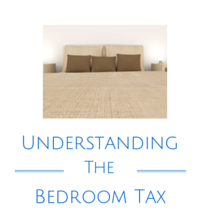Understanding the Bedroom Tax

The spare room subsidy, commonly known as the ‘bedroom tax’, was introduced by the coalition government on April 1st 2013, and is seen as a controversial measure in the social housing sector and the wider economy. While it’s only directly applicable to landlords renting through housing associations or letting to social tenants (sometimes known as DSS tenants), it’s also had a knock on effect on landlords in the private rental markets.
Here, we look at what you need to know about the bedroom tax, how it can affect your tenants and ways that you can help insulate yourself from risk in future property purchases.
What is the Bedroom Tax?
The government introduced the bedroom tax in an attempt to realign supply and demand for social housing. In the UK we have a large amount of social tenants who are living in houses with more bedrooms than required, alongside a serious overcrowding problem. The bedroom tax is an attempt to correct this market failure.
The bedroom tax works by ‘taxing’ money from housing allowances for tenants who have more bedrooms than required in their properties. For example, if you have a four bedroom house and only three residents, your social tenants will be expected to pay tax on their housing allowance.
What does this mean for Landlords?
Take an example where your property’s rent is £100 per week which previously was covered by your tenants’ housing allowance. However, as you only have three tenants and four bedrooms, you are considered as having one spare bedroom. This means that your tenants will take a deduction of £14 per week from their housing allowance.
This is, unfortunately, £14 that will be owed to you. It may be that your tenants can pay the difference and do so every week, but it may be more difficult for some social tenants to cover the extra costs.
How is the Deduction Calculated?
The deduction is calculated based upon the number of spare bedrooms each household has. One spare bedroom will entail a deduction of 14% of their weekly rent, while two spare bedrooms will entail a deduction of 25%. Even if you have more spare bedrooms than this, your tenants will only suffer a maximum reduction of 25%.
When determining how many rooms you have ‘spare’, there are some allowances that must be taken into account. For example, if you are letting to a couple they will be expected to share a room, as will children aged under ten regardless of gender and children aged under sixteen of the same gender. Extra rooms are allowed for full-time carers however, and shared properties are also excluded.
Implications for DSS Landlords
For most DSS landlords, the bedroom tax won’t have any immediate financial implications, however it could put your let in financial difficulty in the future. You might find that, all of a sudden, your tenants are struggling to find the extra money, as even though it may only seem like small change, £14 a week over a year adds up to £728.
For some, the reduction might be more serious and could leave your tenants with no other option but to seek somewhere else to live, meaning you will have to find new tenants. Those letting larger houses are likely to be affected the most, as there may not be a ready supply of tenants available to take up all the rooms in their properties.
Non-DSS Landlords
Even if you’re landlord who doesn’t let to DSS tenants, there are still implications of the bedroom tax. For example, it’s quite possible that the bedroom tax could actually reduce the number of properties available for social tenants as landlords begin to drop out of the market. As a result, we could end up seeing a significant amount of new private rental properties entering the market.
It’s also likely that if your current tenants fall into financial trouble, the chances of housing benefit being able to make up the difference between your tenants’ earnings and their rent will be considerably less. The bedroom tax will also be putting a squeeze on, and adding extra risk to, almost all rental properties in the UK.
While most landlords won’t be affected by the changes in housing benefit, it’s certainly something that DSS landlords should have already talked to their tenants about, and if they haven’t should do so straight away. The bedroom tax is likely to be just one of a number of big steps to reform the UK’s social housing market, and whatever new solutions are proposed over the upcoming months are sure to be big manifesto points for all political parties during the upcoming 2015 election.


